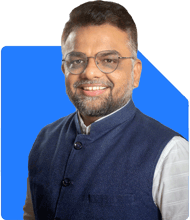Vivek Shah | Answer |Ask -Follow
Financial Planner - Answered on Feb 13, 2023
Shah founded Finrise, a financial planning and wealth management firm, in 2011. He believes that equity investment is the only way to generate long term wealth.
He has an MBA in finance, a degree in chartered accountancy and is a registered life planner from Kinder Institute of Life Planning, USA.... more

Sir Is it right time to invest in Mutual funds as the stock prices are falling due to Adani Problem
1) Goal or financial goal or purpose of doing investment.
This will matter a lot as a goal of child education and retirement needs to see with different perspective and also should have asset allocation and market cap exposure accordingly.
2) Time Horizon of your goals- this is very important as it will help you to select the asset class and it's allocation based on your time period of financial goals. This is where investor makes biggest mistake of misalignment of asset time cycle and goals time period. If you allign this properly, your journey will be quite smooth.
3) Optimum Return expectations on your capital invested-
If you are saving and investing for some better future to fulfill your goals offcourse you will ask something in return which should be respectable higher returns than inflation for long term period( more than 7 years). If you are investing in India than equity return assumptions and calculations should be based on 12% return expectations and debt it should be 6.5%. Remember that you should assume practical return assumptions ( not the highest or what your friend says) as you can put any number in the excel sheet for your mental satisfaction😃
4) Risk taken on your capital-
Risk is a very negative word being taken in india but actually it's the risk appetite and risk acceptance of an investor which makes his outcome/ returns favourable. Understand one thing that if you want high returns you have to assume high risk and there is no option for it or an investor has to be happy with sub optimal returns if he is not ready to take risk.
Risk according to me is the capacity of a person until where and when he will not have any palpation in his stomach and he can absorb the downside easily( both realised and majority of time unrealised).
You should remember one thing that after deciding on above parameters, TIME IN THE MARKET IS MORE IMPORTANT RATHER THAN TIMING THE MARKET. As an investor, wealth is created over a period of decade and have your allocation to equity accordingly and enjoy the journey of markets which is going to be up and down.
After looking at all these parameters you can think of taking allocations to equity mutual funds and decide how much allocation to equity mutual funds is comfortable to you. If you dont have any prior expertise in investing in mutual funds or equity markets, its better to hire an advisor to help you do that or start with allocation in Equity Diversified mutual funds which will help you to take exposure in stocks.
And after all that, i would say it's your behaviour and emotions management which will help you create wealth in the equity market.
I hope this helps. Happy investing
You may like to see similar questions and answers below
Omkeshwar Singh | Answer |Ask -Follow
Head, Rank MF - Answered on Nov 06, 2020
Hemant Bokil | Answer |Ask -Follow
Financial Planner - Answered on Apr 27, 2023
Ulhas Joshi |280 Answers |Ask -Follow
Mutual Fund Expert - Answered on Jun 20, 2023
Ramalingam Kalirajan |10923 Answers |Ask -Follow
Mutual Funds, Financial Planning Expert - Answered on May 07, 2024
Ravi Mittal |679 Answers |Ask -Follow
Dating, Relationships Expert - Answered on Dec 22, 2025
Ramalingam Kalirajan |10923 Answers |Ask -Follow
Mutual Funds, Financial Planning Expert - Answered on Dec 22, 2025
Ramalingam Kalirajan |10923 Answers |Ask -Follow
Mutual Funds, Financial Planning Expert - Answered on Dec 22, 2025
Ramalingam Kalirajan |10923 Answers |Ask -Follow
Mutual Funds, Financial Planning Expert - Answered on Dec 22, 2025
Ramalingam Kalirajan |10923 Answers |Ask -Follow
Mutual Funds, Financial Planning Expert - Answered on Dec 22, 2025
Ramalingam Kalirajan |10923 Answers |Ask -Follow
Mutual Funds, Financial Planning Expert - Answered on Dec 22, 2025
Ramalingam Kalirajan |10923 Answers |Ask -Follow
Mutual Funds, Financial Planning Expert - Answered on Dec 22, 2025
Ramalingam Kalirajan |10923 Answers |Ask -Follow
Mutual Funds, Financial Planning Expert - Answered on Dec 22, 2025
Ramalingam Kalirajan |10923 Answers |Ask -Follow
Mutual Funds, Financial Planning Expert - Answered on Dec 22, 2025
Ramalingam Kalirajan |10923 Answers |Ask -Follow
Mutual Funds, Financial Planning Expert - Answered on Dec 22, 2025

























